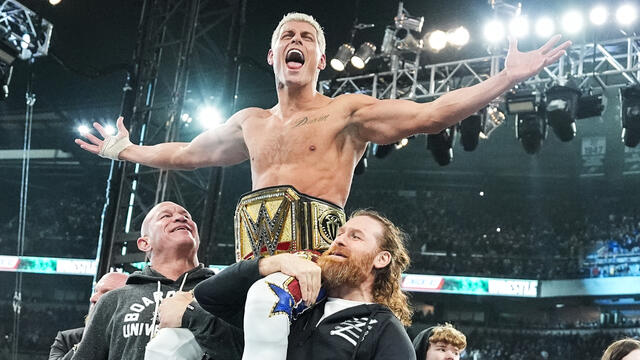
Remembering the night Ron Simmons made sports-entertainment history

Ron Simmons
Aug. 2, 1992, was one of the most memorable moments in sports-entertainment.
It was on that night in Baltimore, that Ron Simmons became the first African American recognized as World Heavyweight Champion in wrestling. History was made when the former Florida State All-American defensive lineman power slammed the 400-plus pound Vader to become the first of his race to earn the status of World Champion. ( WATCH FULL MATCH)
The fans' reaction to Simmons’ victory that night is still a vivid memory. The packed crowd in the weathered Baltimore Arena came to their feet with jubilation bordering on shock. Vader was a seemingly unstoppable monster — a super heavyweight with unparalleled international success who was considered one of the greatest big men of any era. The former football star at the University of Colorado also had the in-ring experience advantage on Simmons and was expected to make Ron another victim. Vader’s mistake was discounting Ron’s overwhelming desire to succeed and to make history on that hot, summer night.
Ron Simmons’ journey began in rural Georgia where he became one of the most honored high school football players in the state’s history. Simmons left the town of Warner Robins as America’s most coveted high school football recruit and signed a national letter of intent to take his skills to Florida State University to play football for legendary coach Bobby Bowden.
At FSU, No. 50 became a four-time All-American defensive lineman, played in three bowl games and is credited by Bowden as being the one player that turned FSU from a pedestrian football school into a national powerhouse. Later, Ron was inducted into both the Orange Bowl Hall of Fame and College Football Hall of Fame and his number was retired by Florida State.
But what Ron Simmons did in Baltimore in ’92 made more of a profound social statement than any of his amazing gridiron accolades.
The black man’s journey within the genre of grappling wasn’t unlike the challenges their brethren faced in professional sports, entertainment and, most importantly, everyday life. To say it was challenging would be a massive understatement.
History tells us that the first black pro wrestler was a man named Viro Small, a former slave who wrestled by the name of Black Sam in the 1870s. But, for many years, black wrestlers were forbidden in many states from competing against Caucasians. WWE Hall of Famer Bobo Brazil wrestled in the first mixed race bout involving a Caucasian in Georgia in 1970. That’s the year I graduated high school, so I’m of the mindset it wasn’t that long ago.
Some promoters made sure that they never exceeded their unwritten “quota” of African American wrestlers on their roster in a given territory. When a black man was featured, he was usually a fan favorite, because of the racial tension that existed in those days and the fear that a black villain could possibly cause riots with the largely white audience. At that time, many arenas in the south didn’t even allow black people to buy a ticket to watch the show. Those that did oftentimes made the people of color sit in a special section, which were generally the worst seats in the house.
Great black wrestlers like Luther Lindsey, Woody Strode and Bearcat Wright helped blaze the trail that would one day lead to Ron’s title victory. WWE Hall of Famers like Ernie Ladd and Abdullah the Butcher, along with Sweet Daddy Siki, also deserve credit as they accepted being wrestling villains. That took amazing courage and conviction considering that the audiences were primarily nonblack and the prevailing tension that existed between fans and the antagonists.
WCW President and WWE Hall of Famer Bill Watts was the captain of the WCW ship when Simmons won the championship in 1992. Watts always had the belief that the best players should be playing and he saw Simmons as a magnificent athlete with strength, power, courage, and charisma. Simply put, he did not judge Ron by the color of his skin.
Watts’ experience with yet another WWE Hall of Fame member, Sylvester Ritter akaThe Junkyard Dog, in Mid-South Wrestling had long ago proven his theory that the best men — no matter their race, color or creed — would ascend to the top of the roster.
Ron Simmons’ victory over Vader to become the first African American to be recognized by a national organization as the World Heavyweight Champion brought positive media attention to the Atlanta-based organization. I recall proudly standing in the CNN Center in Atlanta where hundreds and hundreds of fans and Turner employees filled the common area for a reception in honor of the new champ. It was a joyous day. Tears flowed and young children saw that dreams could be realized if one utilized their God-given talents, worked hard and refused to give up on their dreams.
I have been blessed and privileged to have broadcast many amazing bouts in my career, but looking back, arguably, I cannot say that I ever called one with more social significance than Aug. 2, 1992. That day, Ron Simmons proudly rose to the top of the mountain and achieved victory for the most important race of all — the human race.
Click here to order J.R.'s famous BBQ sauce on WWE Shop and follow the WWE Hall of Famer on Twitter.
WWE Shows Latest Results
Raw results, April 15, 2024: Chad Gable viciously attacks Sami Zayn after losing to Zayn in Intercontinental Title Match!
Full ResultsSmackDown results, April 12, 2024: LA Knight and AJ Styles earn victories for a chance to challenge Cody Rhodes at WWE Backlash!
Full ResultsWWE NXT results, April 16, 2024: Trick Williams defeats Carmelo Hayes in a Steel Cage Match
Full Results














